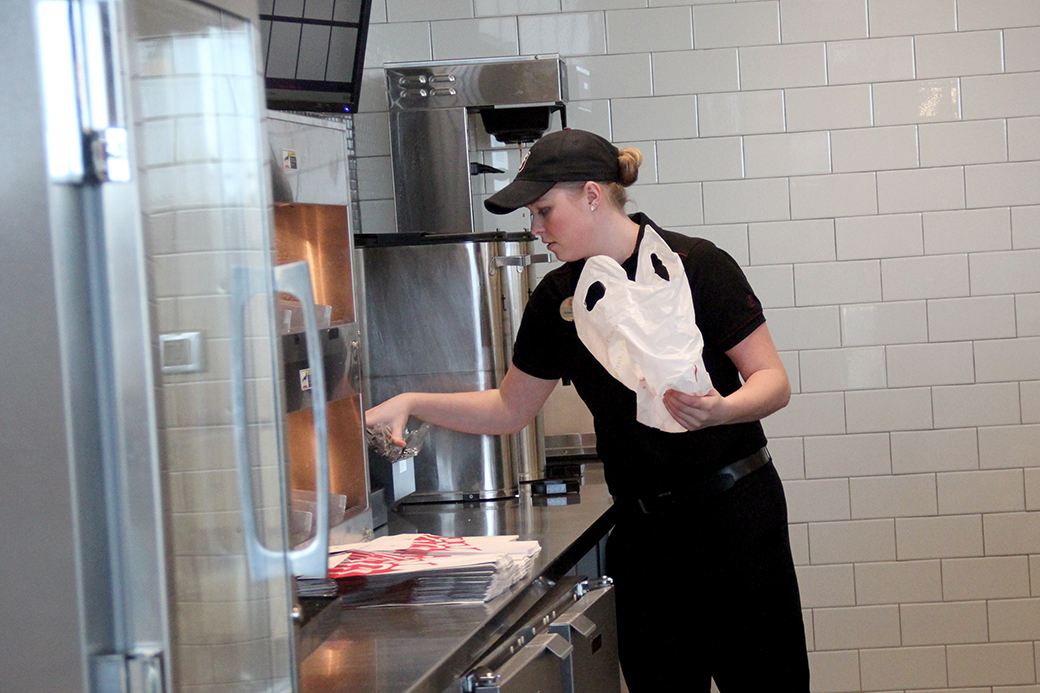
Students learn to ‘be okay with being poor for a while’
Some students are excited to leave their hometown after graduating high school to get away from family or to have a fresh start, but junior Ali Stonebraker was excited to leave her hometown so she would stop spending her money.
She knows all too well what it’s like to struggle to keep money in the bank.
Stonebraker, of Omaha, Neb., indulged herself with high spending at the mall during high school, but when she came to college she realized the impact of her shopping habits.
“I never had any money,” Stonebraker said. “My mom and I talked last summer about how I needed to really start saving.”
Now Stonebraker balances her time between a rigorous nursing program and working about 20 hours each week at Mexico Viejo.
She focuses her earnings toward living expenses and school.
“I save up for odds and ends like getting a new apartment next year,” Stonebraker said. “I have to budget everything for like groceries. And I help pay for tuition and I’m in Alpha Phi, too, so I have to help pay for my dues for that.”
Brent Clark, an assistant professor in the School of Business, said people tend to value money more if they worked for it, as opposed to getting it from scholarships or a fund set up by parents.
“There’s a big difference in attitude about money when it’s money that you earned through your own sweat and tears and effort,” Clark said.
Clark recommends that students start focusing on paying off debts that may be hanging over their heads.
“It is financially the most efficient if you can pay off your debts before you start saving,” Clark said. “I think your debt comes first.”
[notification type=”grey” title=”Tips on managing your money as a college student (courtesy of Brent Clark, assistant professor, School of Business)”]1. Always, always, always pay off your credit card balance each month. 2. Avoid taking out loans for things other than education. 3. Drink more water. It’s free, and it’s better for you. 4. Spend money on things that make you happy, as opposed to things that create a lifestyle. 5. Don’t spend all of your student loan money if you can help it. It all has to be repaid and is not free money. 6. Live with others so you can share rent and utilities. 7. Track your food and entertainment expenses for one month. You might be surprised.[/notification]
Another tip from Clark included giving away money from each paycheck.
“Some experts on financial literacy recommend that people save 10 or 20 percent of their income and give away 10 percent of their income to charitable causes,” Clark said. “It allows you to learn and gain the mindset that you can make do with less than you earn, and that’s the biggest predictor of financial contentment.”
Clark also said being conservative with spending is important, as well as understanding it is more difficult to maintain a luxurious, comfortable lifestyle as a college student.
“Be okay with being poor for a while,” Clark said. “Being poor now can help you be more happy later.”
Senior Lexie Madsen also knows the value of working during college and has been working on campus since freshman year.
“It helps pay the bills, and I make enough throughout the month that I can also save,” Madsen said.
Madsen did work-study for the Communication Sciences and Disorders clinic her sophomore year by helping in the front office with filing, errands and other administrative work.
She has been working for campus dining since her freshmen year and currently works at Chick-fil-A.
Both Madsen and Stonebraker said knowing how to budget is essential to managing money in college.
“Think about the future and what you are trying to save for and what’s necessary and what isn’t,” Stonebraker said.
(Photo: Senior Lexie Madsen helps a customer as she works at Chick-fil-A Jan. 27. Madsen has worked on campus since freshman year to save up money for current and future expenses like graduate school. Natalie Keller / The Volante)

